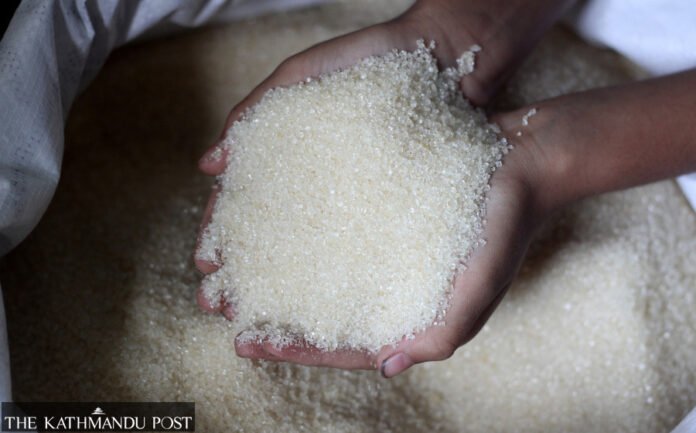The release of 25,000 tonnes of sugar will be made available through the National Cooperative Exports Limited (NCEL).
At a time when the country is facing a serious sugar crisis, India has allowed to export 25,000 tonnes of sugar to Nepal with immediate effect.
The same facility is given to another South Asian country Bhutan that is vastly dependent on India in sugar and facing a similar kind of crisis like Nepal.
According to a decision taken by India’s Ministry of Consumer Affairs, Food and Public Distribution on Thursday, the release of 25,000 tonnes of sugar will be made available through the National Cooperative Exports Limited (NCEL).
The Directorate General of Foreign Trade (DGFT) in an October 18 notice had extended the restriction on sugar exports beyond October 31 until further notice. However, a Committee of Ministers formed to review the price and availability of essential commodities decided to allow the sugar export to Nepal and Bhutan through NCEL.
Consumers in Nepal have been facing serious sugar shortages during festive seasons due to the export ban. The allotted export by the Southern neighbour may meet demands for three to four months, say Nepali officials.
India has been halting shipments of sugar for the first time in seven years saying that lack of rain has cut cane yields. India allowed mills to export only 6.1 million tonnes of sugar until September 30, after letting them sell a record 11.1 million tonnes during the last season.
Directorate of Sugar, Vegetable Oils, Department of Food and Public Distribution, Ministry of Consumer Affairs, Food and Public Distribution, in exercise of powers conferred by section 3 of the Essential Commodities Act, 1995 read with the clauses 4 and 5 of sugar (control) order, 1996, grants permission to the NCEL to export 25,000 tonnes of sugar each to Nepal and Bhutan till September, 2024, reads the export release order seen by the Post.
A senior official at the Ministry of Agriculture said that although they are aware of India’s decision, they are yet to receive formal information.
“Once we receive a formal notice on the decision, we will correspond with NCEL and move forward with the imports as soon as possible given the urgency of the matter,” the official told the Post.
Two government agencies— Salt Trading Corporation and Food Management and Trading Company– had called separate international tenders for importing sugar but they were not sufficient. The decision of the Indian government comes as a huge relief to us but not sufficient, the official added.
On September 13, the Finance Ministry approved the import of 20,000 tonnes of sugar for the festive season.
The Ministry of Industry, Commerce, and Supplies had asked to import 60,000 tonnes of sugar to meet the anticipated festival demand. Despite these approvals, sugar imports are dismal and the general public is forced to pay almost double the price to get sugar from the market or there is no availability of sugar.
Ahead of the Dashain festival, sugar was available for Rs88 per kg a few weeks ago, but now it costs Rs140 per kg in the black market, according to consumer rights groups.
Nepal’s annual sugar requirement is around 270,000 tonnes.
The country faces a deficit of about 100,000 tonnes of the sweetener annually which is fulfilled through imports by the private sector and sometimes by the two government companies.
Nepal used to produce 155,000 tonnes of sugar annually till a few years ago, which has now declined to 120,000 tonnes after sugar mill owners failed to pay sugarcane growers on time, according to the Salt Trading Corporation.





